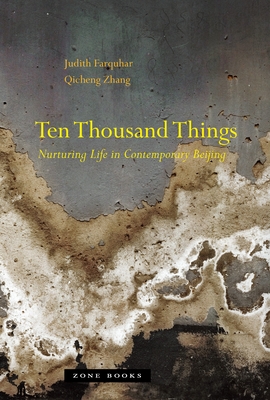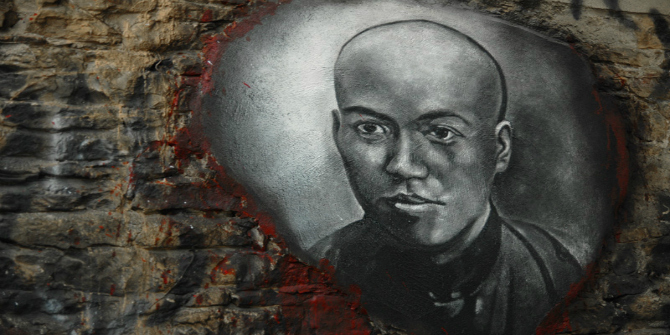 Ten Thousand Things explores the many forms of life, or, in ancient Chinese parlance “the ten thousand things” that life is and is becoming, in contemporary Beijing and beyond. Coauthored by an American anthropologist and a Chinese philosopher, the book examines the myriad ways contemporary residents of Beijing understand and nurture the good life. Against the too common stories of factories, smog and overworked labour, Karl Baker finds that this study offers an intimate view of the remarkable vivacity of ordinary Chinese urban lives.
Ten Thousand Things explores the many forms of life, or, in ancient Chinese parlance “the ten thousand things” that life is and is becoming, in contemporary Beijing and beyond. Coauthored by an American anthropologist and a Chinese philosopher, the book examines the myriad ways contemporary residents of Beijing understand and nurture the good life. Against the too common stories of factories, smog and overworked labour, Karl Baker finds that this study offers an intimate view of the remarkable vivacity of ordinary Chinese urban lives.
 Ten Thousand Things: Nurturing Life in Contemporary Beijing. Judith Farquhar and Qicheng Zhang. MIT Press. April 2012.
Ten Thousand Things: Nurturing Life in Contemporary Beijing. Judith Farquhar and Qicheng Zhang. MIT Press. April 2012.
As London scrubs itself up for the Olympics, Ten Thousand Things takes us to Beijing during the build-up to the 2008 games. The Chinese capital’s far more radical transformation in the years prior to the Olympics makes London’s recent property boom look tame and the early 2000s will probably go down as the decade when China’s major cities underwent their most rapid shift toward a globally-oriented hyper-modernism.
It is in this context of urban transformation that Judith Farquhar and Qicheng Zhang offer “an ethnographic and philosophical study of everyday life activism in contemporary Beijing”. Focusing on the daily lives of ordinary residents rather than the cities changing skyline, they explore the wider significance of ‘yangsheng’ – what might be seen as a popular health ‘fad’ among Beijing’s elderly and retired. Loosely translated as ‘nurturing’ (yang) ‘life’ (sheng) yangsheng encompasses a wide array of deliberate everyday practices of self-cultivation:
“The way (dao) of yangsheng is eating and sleeping, talking and singing, playing ball and taking pictures, writing and painting, writing poetry line by line, playing chess to banish the blues, chatting of heaven, speaking of earth”
This popular and rather poetic verse repeated by a number of Beijingers interviewed for the book, points to the breadth of activities seen as contributing to the ‘nurturing of life’ and so the health and wellbeing of Beijing’s people. On an evening stroll through parks in the West City District, we encounter groups engaged in folk singing, tai chi, ballroom dancing, crochet and kite flying – collective activities understood by Farquhar and Zhang as contributing to “an effective health regime” while also being forms of “unproductive pleasure”.
The core of the book reports on a series of interviews with these inhabitants of Beijing’s public spaces, who from an Anglo-American perspective might be seen to be ‘living their private lives in public’. The two authors, Farquhar an American anthropologist and Zhang a Chinese philosopher, provide a sympathetic yet not un-critical response to the yangsheng phenomena.
Conducting their research in the years leading up to 2008, the authors interpret the popular enthusiasm for yangsheng as driven by both practical economic imperatives and deeper philosophical considerations. On the one hand a publishing boom in self-help texts has coincided with a neoliberal politico-economic turn and the withdrawal of state provision of healthcare so forcing individual responsibility for healthcare. On the other, a renewed Chinese nationalism has taken interest in ancient Chinese heritage and a “crisis of belief” in the wake of communism has prompted a search for new strategies of coping and rejoicing in the contemporary city.
Although no doubt informed by ancient Chinese tradition, the authors insist that yangsheng is not a simple reproduction of the past, but rather involves a ‘mining of tradition’ in the face of contemporary concerns. The collective nature of many of the practices likewise connects with China’s Maoist past, but Ten Thousand Things also highlights the distinctiveness of yangsheng from well-known images of socialist group exercises, suggesting that activities like group singing in the park cannot be reduced to imaginations of Chinese “collective asceticism and resigned acceptance of domination”. Rather, what is often prioritised by participants is a form of pleasure grounded in ideas of order, harmony and gentle self-discipline.
The authors each approach their subjects from different cultural and disciplinary backgrounds making for a rewarding dialogue and a text that eschews attempts to present a unified voice. Farquhar pursues her long-standing anthropological investigations of Chinese medicine, seeing how yangsheng embodies a specific Chinese culture of healthcare. The titbits of practical advice we glean from the interviews with elderly urbanites provide tempting fodder for self-reflection on western ideas of health; “there is no illness when a person is in good spirits”. While conventional health advice deals in pills and prohibitions delivered by experts, yangsheng is a vernacular “art of the everyday, trading in techniques, rules of thumb, small routines”.
Zhang’s philosophical material introduces us to an intriguing conceptualisation of life and the natural world which is linked to these Chinese understandings of bodily health. The book’s title Ten Thousand Things draws on an idea of the teeming and myriad ‘things’ that make up the natural world: “Life is a process of unceasing genesis … The natural world’s unceasing birthing and growing, producing and ripening is called ‘giving life to life’”. This world of emergence, unfolding and constant transformation is beautifully expressed, although drawing the links between the extensive discussion of ‘qi transformation’ and the more concrete observations of ordinary urban life requires work on the part of the reader.
The spaces between the philosophy and the ethnography are perhaps deliberate and help open the reader’s mind to a refreshing mode of looking at one’s own life and our conceptualisations of Chinese urban existence. Against the too common stories of factories, smog and overworked labour, this study offers an intimate view of the remarkable vivacity of ordinary Chinese urban lives.
Ten Thousand Things is a book as carefully crafted as the well-cultivated Beijing lives it describes. The collaboration between disciplinary traditions and languages offers a rich collection of deep reflections and empirical observations that boldly attempts to translate complex Chinese world-views into the English language. As the teeming life of China’s cities threatens to be re-ordered into a blander and more sanitised urbanism, let’s hope space remains for flying kites, singing in the park and nurturing life. A lesson as important for London as it is for Beijing.
——————————————————————————————-
Karl Baker is a Researcher at LSE Cities, at the London School of Economics and Political Science. Karl recently graduated from the MSc City Design and Social Science programme at the LSE. He also holds a BA (Hons) in Political Science from Victoria University, Wellington. He has previously worked as a policy adviser for New Zealand’s Ministry of Transport where he advised governments on priorities for transport infrastructure investment. He has worked on improving project evaluation methods to better understand the impact of transport infrastructure on the social, environmental and economic performance of cities. Read more reviews by Karl.







